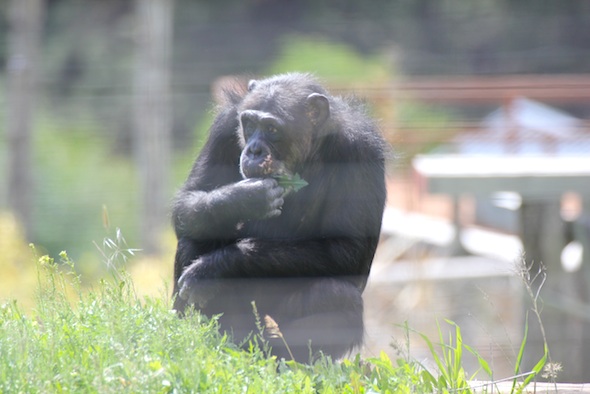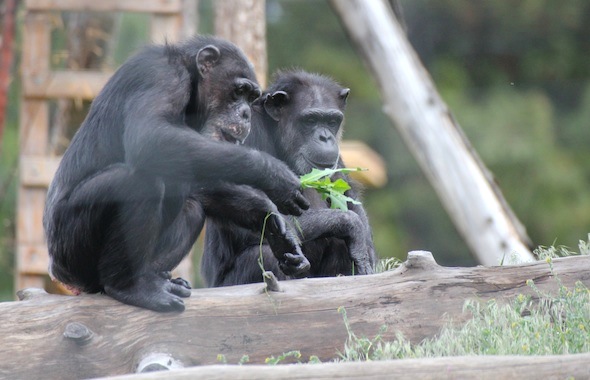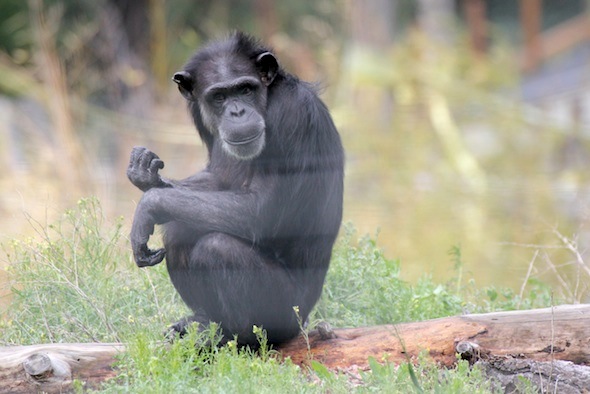Captivity. It’s been in the news a lot, and I know on a lot of our minds.
It is simply a fact of everyday life and work when your occupation is caring for chimpanzees in a sanctuary. We go to great lengths to ensure that the chimpanzees are unable to breach the barriers we have constructed to contain them, and while we do it for both their own safety and the safety of those on the other side of the barriers, it doesn’t change the reality of the situation–the steel caging, bullet-proof glass, electric fence, and many, many locks of which only the humans have the keys.
As a sanctuary, our aim is to attempt to right what we perceive to be a wrong and to give back some measure of what our species has taken from another species, but we don’t view this second chance for the chimpanzees living here as the ideal life, and our friends behind bars often remind us of this. A few years ago, I wrote about my perception of Jamie’s awareness of her own captivity in the context of the shift in how we as a society view what chimpanzees deserve and what our obligations are towards them. You can read that post here.
I am buoyed by the positive events that have occurred for chimpanzees just since writing that post three years ago. We are closer than ever – maybe we are even there – to the end of chimpanzee biomedical research in this country. How did we get here? How did we get to this moment in history where the practice of using chimpanzees in biomedical testing is widely seen as abhorrent from a society that thought it was entirely permissible and within our rights as humans to slaughter chimpanzee families, collect the infants, and ship them across the world to use them in experimentation? There are many specific answers to that question, but the general answer, I think, can be explained by a formula that applies to progress towards greater human rights as well: knowledge + people speaking out + time = societal shifts.
These shifts don’t happen overnight and they don’t happen without resistance. By definition, it takes the majority of people who held onto an “old way” of thinking to either no longer be a part of society or it takes individuals to change their own stance. We all know how stubborn our species is, so the former is often the key factor and is really built into the formula under “time.” But our modern age has given us the ability to gain information and collect knowledge in an instant, and we are quickly made aware of more people speaking out. This allows shifts to happen faster.
As uncomfortable and impassioned as some discussions can get around the practice of keeping great apes and other non-human animals in captivity, I choose to view it as very positive sign that these discussion are happening in a very public way. The proverbial and literal elephant in the room is being pointed out, making it almost impossible to ignore the bigger ethical questions of holding intelligent, highly social, long-lived species in captive environments, generation after generation. What truly justifies this activity?
The thing about societal shifts in thinking, though, is that when you’re in the middle of them, there will be individuals and institutions on both sides. Looking back at shifts that have happened in the past, it’s really difficult to understand how so many people were involved in something that is now viewed as unjust, but that’s the benefit of hindsight. There is no “new way” without an “old way” and the “old way” is something that the majority of people likely had few qualms about, but that doesn’t mean they had some sort of flaw in their character. I applaud the individuals and institutions that are at the forefront of rejecting old, unfair, and unjust ways of doing things, but I understand that some will invariably be slower to adjust–that’s all part of a shift.
Let’s keep talking. Let’s not be afraid of our convictions and our desire for a more just world. And let’s also remember that each of us have different levels of knowledge, exposure to different voices, and may have developed our opinions in a different period of time and societal-wide mentality than ourselves.
In the meantime, let’s be thankful, on behalf of seven chimpanzees in Cle Elum, Washington, that societies do indeed shift towards greater understanding and compassion, and it happens one person at a time. Though we are unable to give the chimpanzees true freedom, we can give them something closer to it than they’ve ever experienced before.
Here’s Missy and Annie enjoying the wild prickly lettuce that they harvested:







